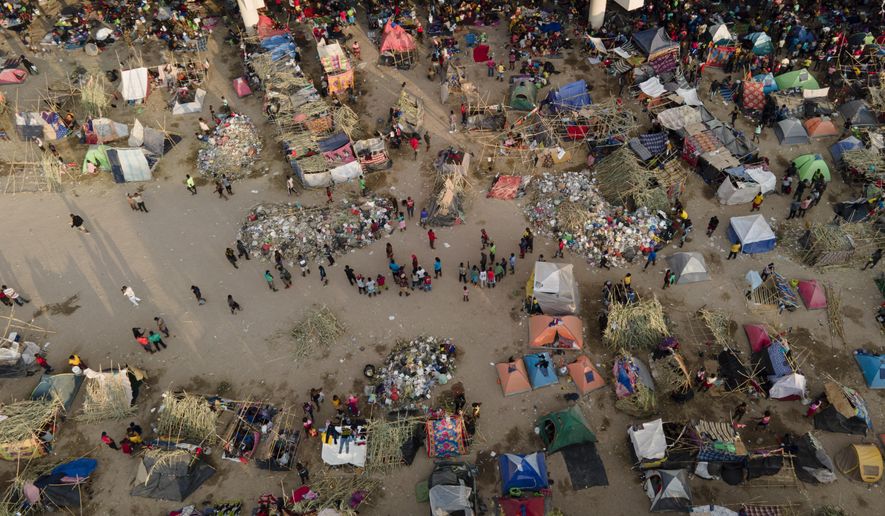The Federal Aviation Administration had decided it was illegal to ban drones flying over the border in Del Rio, Texas, amid last year’s surge of Haitian migrants, but imposed the ban after pleading by a Homeland Security official, according to emails obtained by House GOP investigators.
Rep. James Comer, top Republican on the House Oversight and Reform Committee, said the documents seem to show the FAA bent its own understanding of the rules in order to “censor” media coverage of the chaotic U.S.-Mexico border under President Biden.
The no-fly order had the effect, at least temporarily, of blinding news organizations that had taken to the sky to show the thousands of Haitians who had stormed the U.S. bank of the Rio Grande last September, commandeering space for a migrant camp underneath the international bridge in Del Rio.
“The FAA’s decision to abruptly reverse course on the legality of banning media drones raises questions about potential political interference at the agency to hide President Biden’s border crisis from the public,” Mr. Comer and fellow Republicans on the committee wrote in a letter Monday to FAA Administrator Steve Dickson.
Customs and Border Protection, the Homeland Security agency that manages the border, requested the drone ban on Sept. 16.
According to an official from CBP’s Air and Marine Operations division, agents and officers feared the drones endangered their safety.
DOCUMENT: House GOP lawmakers' letter to FAA
The official, whose name was redacted from the documents provided to Mr. Comer, said there had been “several” drones flown in the area, coming “less than a few feet from responding officers/agents.” The official said the Border Patrol wanted a ban “ASAP.”
An FAA manager in the System Operations Support Center rejected the request, saying it was “illegal for us to restrict airspace for the purposes as specified.”
But a later email indicates a subsequent phone conversation between the two figures, and the ban was issued later that day at 5:18 p.m. in Del Rio.
Oversight Committee Republicans say that raises “concerns about its legality.”
In a statement Monday, the FAA again didn’t address why it changed its initial legal ruling, but did defend the ultimate bar itself, saying there were dozens of drones being flown in the same airspace as law enforcement, and it was creating a safety threat.
Documents the FAA recently turned over to the Republicans, in response to a request last September, don’t reveal what the CBP official said to change the FAA’s mind.
The Republicans, in their letter Monday, requested an explanation for the legal reversal.
“These e-mails call into question FAA’s conduct, particularly where a TFR may have been issued improperly and for the purpose of disrupting media attention related to the border crisis,” the Republicans said in their letter. “The American people have a right to transparency when it comes to President Biden’s failed border and interior enforcement policies.”
FAA bans are known officially as Temporary Flight Restrictions, or TFRs. The Del Rio TFR was to last two weeks and carried a warning that drones flown in violation could be disrupted or destroyed by the government.
News outlets were using drones to capture the massive size of the border incursion in a way photos from the ground had not.
That made the decision to impose the drone ban controversial at the time — and the revelation that the FAA initially thought it illegal only adds to the controversy.
The ban grounded Fox News, which had been getting dramatic footage of the chaos by using a drone.
The FAA says Fox and Reuters applied for waivers the next day, and they were both granted. CNN and NBC News also applied and were approved.
“The FAA provided access to the airspace over Del Rio to every media outlet that requested it within approximately an hour,” the agency told The Times on Monday.
Waiver requests from the Texas Department of Public Safety and CBP also won approval, the FAA said in court documents.
The Haitian incursion exposed a significant hole in America’s border security, with the migrants managing to travel to and from Mexico at will. Some would wade back into Mexico for food, then return to the U.S. to pick up their place in line for Border Patrol processing.
Border agents said the massive migrant camp sprung up outside their control and described the situation as a “powder keg.”
Homeland Security officials said agents made about 29,000 arrests in Del Rio from Sept. 9-24. About 8,000 voluntarily waded back to Mexico, and another 8,000 were flown back to Haiti on repatriation flights. More than 13,000 others were allowed to remain, with many being caught then released into American communities.
• Stephen Dinan can be reached at sdinan@washingtontimes.com.




Please read our comment policy before commenting.